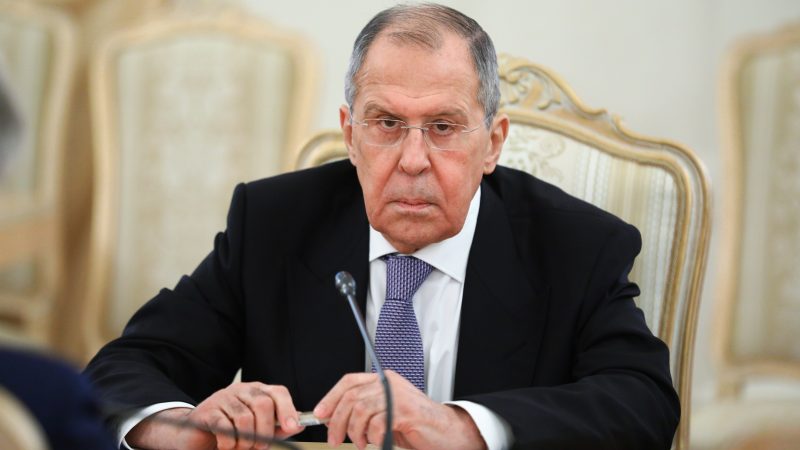Ukrainian Foreign Ministry Spokesman Oleg Nikolenko said Russia must take the first step to unblock Ukrainian food exports by withdrawing forces from the country’s maritime waters and providing security guarantees against attacks on ports and merchant ships.
His statement came in response to recent comments from Russian Foreign Minister Sergei Lavrov, who said Moscow would guarantee the safe passage of grain vessels if Ukraine demines the Black Sea’s coastal waters.
“Russia’s actions can lead to a global food crisis, and in some regions - even to a situation of hunger,” Nikolenko wrote on his Facebook page on Thursday.
“Russia must immediately unblock Ukrainian seaports, stop shelling Odesa and other coastal cities, lead its navy to a distance that will make it impossible to attack merchant ships.”
According to Nikolenko, about 22 million tonnes of grain are stuck in ports and cannot reach final consumers, primarily in Africa and Asia, due to the Russian blockade.
“Alternative overland routes will not completely solve the problem, as they have low transit capacity,” he added, blaming Russia for stealing Ukrainian grain to sell it to a third country.
Speaking at a press conference during his visit to Bahrain on Tuesday, Lavrov said Russia would guarantee the passage of grain ships as long as Ukraine removes mines from its coastal waters.
“If this problem is solved, then on the high seas, the Russian naval forces will ensure the unhindered passage of these ships to the Mediterranean Sea and further to their destinations,” Lavrov told reporters.
Since Russia started what it calls a “special military operation” on February 24, Ukraine’s Black Sea ports have been blocked, trapping millions of tonnes of grain in the country’s silos. In response, Ukrainian forces have blocked its seaports by laying floating mines to prevent Russian warships from approaching its main ports.
Ukraine, known as the “breadbasket of Europe,” is a top grain supplier to dozens of developing countries. Last year, its grain export totaled $12.2 billion, accounting for nearly a fifth of the country’s exports. Before the war, Ukraine exported 98 percent of its cereals and oilseed via the Black Sea, at a rate of up to 6 million tonnes per month. But with the ports blocked and the railway system unable to cope with the extra volume, the country is currently only exporting between 1-1.5 million tonnes a month.
The inability to export grain from Ukraine ports has led to surging food prices and fears of a global food crisis.
Western leaders have accused Russian President Vladimir Putin of using food as a powerful weapon in his war with Ukraine. Moscow has denied these claims and pinned the blame on Western sanctions for exacerbating the food crisis.
Earlier, the Kremlin voiced its readiness to open a humanitarian corridor in the Black Sea for food-carrying ships leaving Ukraine in return for the lifting of sanctions.
Since Russia invaded Ukraine, Western nations have tightened the screws on Moscow through severe sanctions that have crippled its economy and penalized government officials and their family members. Western powers have targeted several large financial institutions, Russian sovereign debt, and wealthy individuals from Russia.
Western countries have also agreed to exclude sanctioned Russian banks from an international payment system known as SWIFT, used by thousands of financial institutions worldwide. The existing sanctions have blocked Russia from importing key technologies, including those for defense, energy, telecoms, and aviation sectors.







 Armenian sappers commenced on Monday mine-clearance operations in the territories adjacent to the Saint Mary Church in village of Voskepar (Armenia...
Armenian sappers commenced on Monday mine-clearance operations in the territories adjacent to the Saint Mary Church in village of Voskepar (Armenia...
 Russian Foreign Minister Sergei Lavrov has reasserted that Moscow has no intentions to stop the fighting in Ukraine, even if peace talks commence.
Russian Foreign Minister Sergei Lavrov has reasserted that Moscow has no intentions to stop the fighting in Ukraine, even if peace talks commence.
 Iran has refuted reports of alleged damage to Shimon Peres Negev Nuclear Research Centre located southeast of Dimona, Israel, during the recent air...
Iran has refuted reports of alleged damage to Shimon Peres Negev Nuclear Research Centre located southeast of Dimona, Israel, during the recent air...
 Iran’s Foreign Minister, Hossein Amir-Abdollahian, has labeled a foiled Israeli drone attack in certain parts of the country as a "failure" for Isr...
Iran’s Foreign Minister, Hossein Amir-Abdollahian, has labeled a foiled Israeli drone attack in certain parts of the country as a "failure" for Isr...



